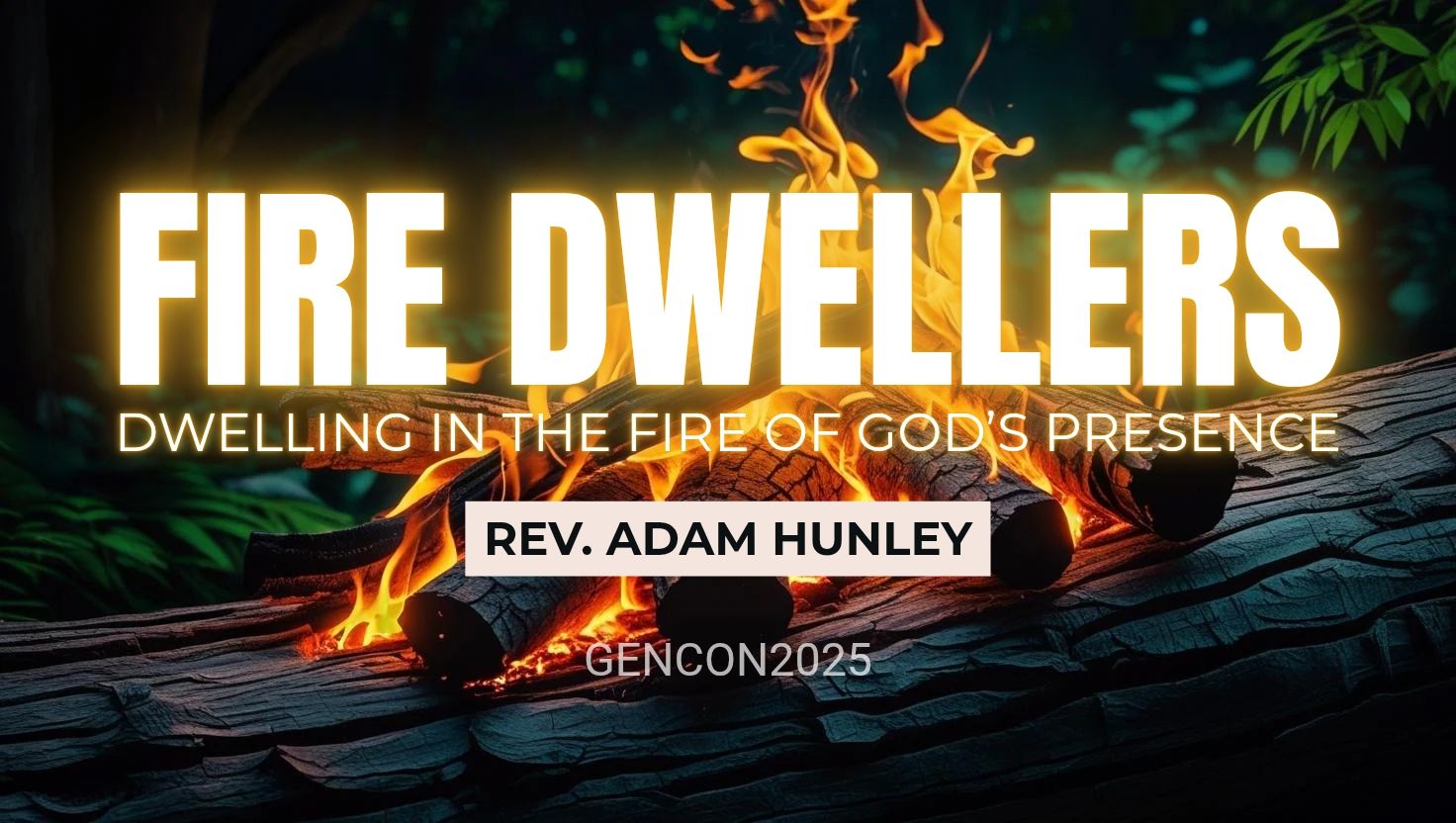Fire Dwellers - Dwelling in the Fire of God's Presence
Rev. Adam Hunley's sermon at General Conference 2025, challenging believers to become "fire dwellers" who live in the transformative fire of God's presence rather than being mere tourists.
Text: Isaiah 33:14-17
Preacher: Rev. Adam Hunley
The Question of the Ages
Rev. Hunley began with Isaiah 33:14-17, where even sinners and hypocrites asked a crucial question:
“Who among us shall dwell with the devouring fire? Who among us shall dwell with everlasting burnings?”
The prophet Isaiah answered:
“He that walketh righteously, and speaketh uprightly… his place of defence shall be the munitions of rocks: bread shall be given him; his waters shall be sure. Thine eyes shall see the king in his beauty.” — Isaiah 33:15-16
This spoke of people who could actually live in God’s fire - not just survive it, but dwell in it.
Fire in the Old Testament - Terror and Judgment
Throughout the Old Testament, fire represented God’s holiness and judgment. Rev. Hunley outlined several examples:
- Flaming sword guarding the Garden of Eden
- Fire from heaven destroying Sodom and Gomorrah
- Mount Sinai burning when God gave the law
- Sacrifices consumed by holy fire
- Cities destroyed under God’s judgment
The reality was clear: humanity could not approach God’s holiness because of sin. As Isaiah 64:6 states:
“We are all as an unclean thing, and all our righteousnesses are as filthy rags.”
Even the high priest feared entering the Holy of Holies, uncertain whether his offering would be accepted. The problem of sin created an infinite boundary between humanity and their holy Creator.
John the Baptist’s Revolutionary Message
Rev. Hunley brought the congregation to Matthew 3, where John the Baptist delivered what seemed like the same old message of judgment - repent or face the fire. But then John declared something unprecedented:
“I indeed baptize you with water unto repentance: but he that cometh after me is mightier than I… he shall baptize you with the Holy Ghost, and with fire.” — Matthew 3:11
This was revolutionary! John was announcing that what was once only judgment could now become empowerment. The fire that previously brought destruction could now bring transformation through baptism.
The Day of Pentecost - Everything Changes
Acts 2 records the fulfillment of John’s prophecy:
“And suddenly there came a sound from heaven as of a rushing mighty wind… And there appeared unto them cloven tongues like as of fire, and it sat upon each of them. And they were all filled with the Holy Ghost, and began to speak with other tongues.” — Acts 2:2-4
Approximately 120 people made the transition from Old Testament fear to New Testament fire. They became fire dwellers - people who could live in God’s presence without being consumed.
Blood-Bought Fire Dwellers
Rev. Hunley explained that when believers are born again of water and Spirit, washed in the blood of Jesus, they can enter a realm previously forbidden to humanity.
Key insight: What is death to one becomes life to another. What destroys one purifies another. What blinds one comforts and guides the other.
The baptism in fire is an immersive experience, not just a partial touching of God’s presence. Believers are completely immersed in the fire of God’s Spirit and power.
What Fire Is and Is Not
Rev. Hunley clarified what living in fire actually means:
Fire is NOT:
- Shouting on Sunday and living like the world on Monday
- Getting emotional and then splitting the church
- Speaking against fellow believers
True fire:
- Changes your life, church, neighborhood, city, province, and nation
- Requires the death of flesh - fire annihilates flesh
- Demands laying aside tradition and personal agendas
The Danger of Quenching the Spirit
Using 1 Thessalonians 5:19 (“Quench not the Spirit”), Rev. Hunley warned against what he called “Holy Ghost tourism” - the practice of visiting the fire on Sundays but living in flesh the rest of the week.
Important distinctions:
- Just being part of the church doesn’t mean you automatically live in fire
- Knowing where the fire is located doesn’t mean you’re living in fire
- Periodically visiting the fire doesn’t mean you’re dwelling in fire
- Having knowledge about fire doesn’t equal living in fire
Fire Cannot Be Controlled
Rev. Hunley emphasized that organizations cannot control fire. Using Acts 16 as an example, he showed how Paul had plans but the Holy Ghost redirected him.
Key points about fire:
- You cannot schedule fire
- You cannot administrate fire
- You cannot plan fire
- Only God controls fire
He warned that trying to control the move of God will prevent fire from manifesting in churches, districts, and nations.
Living as Everyday Fire Dwellers
The sermon concluded with a challenge to all believers. According to the book of Acts, believers (not just pastors) should lay hands on the sick and see them recover. This is possible because believers are called to live in fire every day.
The call: Living in fire is not limited to Sunday services. It’s for every man, woman, boy, and girl who will choose to dwell in the fire of the Holy Ghost.
The Challenge to the Church
Rev. Hunley issued a direct challenge: God is calling the church to lay aside flesh, lay aside tradition, and declare “God, I want to live in fire.”
The revival God desires for the global church will not fit into man-made organizational structures because it was built for God to control, not man.
“Quench not the Spirit.” — 1 Thessalonians 5:19
The message was clear: What once brought terror in the Old Testament has become our dwelling place through Jesus Christ. Believers don’t have to fear God’s fire - they can live in it, move in it, and be transformed by it. The question remains: Will we choose to be fire dwellers or remain Holy Ghost tourists?
Watch the full sermon here.
